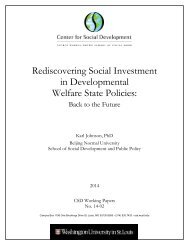Exploring and Assessing Intercultural Competence - Center for ...
Exploring and Assessing Intercultural Competence - Center for ...
Exploring and Assessing Intercultural Competence - Center for ...
You also want an ePaper? Increase the reach of your titles
YUMPU automatically turns print PDFs into web optimized ePapers that Google loves.
Summary<br />
<strong>Exploring</strong> <strong>and</strong> <strong>Assessing</strong> <strong>Intercultural</strong> <strong>Competence</strong><br />
Whereas the question regarding the significance <strong>and</strong> necessity of learning the host tongue may be<br />
discussed by language educators <strong>and</strong> interculturalists from an etic view, it is interesting to learn<br />
about this issue from the hosts’ point of view, especially when the hosts are themselves<br />
monolingual. From the mentor perspective, it was obvious that they all viewed volunteer<br />
knowledge of their language as important – “one of the most important aspects” <strong>and</strong><br />
“fundamental to success”; “it is necessary to life <strong>and</strong> work; one cannot function without it.” Aside<br />
from practical aspects of speaking the host language, the volunteers’ ability drew admiration<br />
thereby enhancing how hosts viewed volunteers even further.<br />
Assertion No. 5: All parties engaged in intercultural contact are affected to some degree <strong>and</strong><br />
in various ways (Impact of ICC contact on mentors) Also:<br />
Assertion No. 3: <strong>Intercultural</strong> experiences are life-altering<br />
Assertion No. 4: Participant choices during the sojourn produce certain<br />
intercultural consequences<br />
Assertion No. 6: Service programs offer unique opportunities <strong>for</strong> sojourners <strong>and</strong><br />
hosts, beyond traditional educational exchanges<br />
Assertion No. 7: People are changed as a result of this experience<br />
Assertion No. 8: Some returnees lean toward specific life choices, life partners,<br />
life styles, values <strong>and</strong> jobs as a result of this experience<br />
(Use of ICC Abilities in My Own Life <strong>and</strong> Work)<br />
Discussion<br />
Here’s what mentors said during interviews (Is) regarding the impact of this experience upon<br />
volunteers, as they saw it:<br />
(FEMV1+I)<br />
- the volunteer faced many difficult situations <strong>and</strong> overcame them<br />
- has been very helpful<br />
- strengthened her vocation<br />
- now sure about direction chosen <strong>for</strong> her life<br />
- she’s more aware of problems in the world<br />
- will help her in her future job<br />
- learned new aspects of health care systems<br />
- learned to deal with bureaucratic issues<br />
(FEMV3+I)<br />
- has become more open<br />
- will help his personal development<br />
- now has more expectations about life<br />
- more open<br />
- got to know new people<br />
- experienced new things<br />
- life changed without a doubt<br />
<strong>Center</strong> <strong>for</strong> Social Development<br />
Washington University in St. Louis<br />
52
















